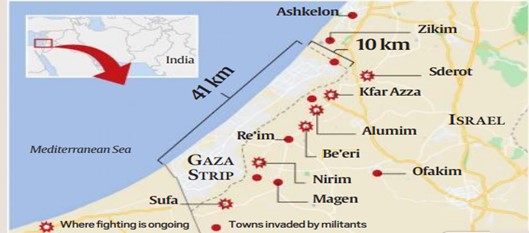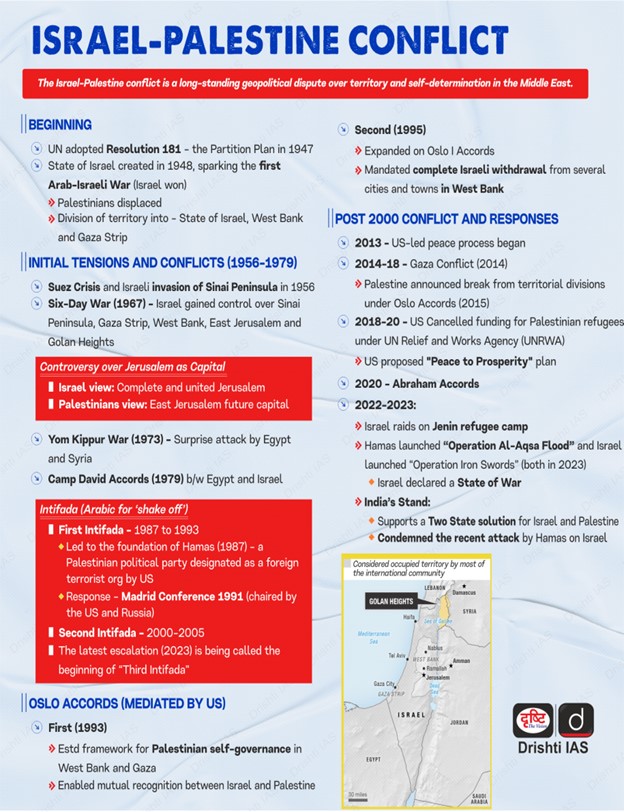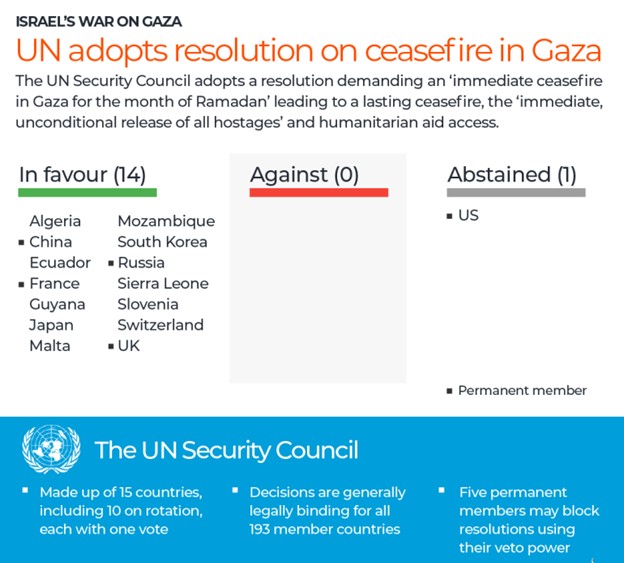International Relations
UNSC Resolution: Ceasefire in Gaza
This editorial is based on “Stop the war” which was published in The Hindu on 27/03/2024. The article discusses how the US supported the first UN Security Council Resolution for an immediate ceasefire in Gaza, which was passed 14-0 on March 25, 2024. The resolution calls for a ceasefire to allow aid to reach Palestinian civilians and for the release of all remaining hostages held by Hamas.
For Prelims: Israel, Palestine, Middle-East, Arab World, Yom Kippur War, Zionism, Al-Aqsa, Gaza Strip, Jerusalem, Palestinian Liberation Organisation (PLO), Strait of Hormuz, India-Middle East-Europe Economic Corridor (IMEC), West Bank, UNSC.
For Mains: Impact of Israel-Palestine Conflict on India and International geopolitical scenario.
After five and a half months since Israel began its assault on Gaza, the UN Security Council (UNSC) issued a call for an "immediate ceasefire" on March 25, 2024. Additionally, the UNSC called for the release of all hostages held by Hamas.
The US, which had previously vetoed every UN resolution calling for an immediate ceasefire in Gaza, abstained this time, indicating a shift in the Biden administration's approach to the conflict.
What was the Resolution Passed by UNSC?
- About:
- Apart from calling for an “immediate ceasefire for the month of Ramadan to be respected by all parties leading to a lasting, sustainable ceasefire”, it also states:
- The release of the Israeli captives taken by Hamas on October 7, 2023 and emphasises the need for more humanitarian aid flowing into Gaza and on adherence to international law.
- Apart from calling for an “immediate ceasefire for the month of Ramadan to be respected by all parties leading to a lasting, sustainable ceasefire”, it also states:
- Nature of the Resolution:
- All UNSC resolutions are considered binding, in accordance with Article 25 of the UN Charter which was ratified by the US. However, the US has described the latest resolution as non-binding.
- If a UNSC resolution is not followed, the council can vote on a follow-up resolution addressing the breach and take punitive action in the form of sanctions or even the authorisation of an international force.
- All UNSC resolutions are considered binding, in accordance with Article 25 of the UN Charter which was ratified by the US. However, the US has described the latest resolution as non-binding.
- Previous Resolutions:
- In 2016, the UNSC passed a resolution deeming Israel’s settlements in Palestine illegal and a violation of international law. The resolution passed with 14 votes and the US abstained. Israel ignored this resolution.
- More recently, in December 2023, the UN General Assembly voted with an overwhelming majority to call for a “humanitarian ceasefire”. That was a non-binding resolution – and Israel refused to act on it.
- Israel is also under the scanner of the International Court of Justice (ICJ), where South Africa has accused it of committing acts of genocide in Gaza.
- In 2016, the UNSC passed a resolution deeming Israel’s settlements in Palestine illegal and a violation of international law. The resolution passed with 14 votes and the US abstained. Israel ignored this resolution.
What is the Role of the US in Passing Resolutions Calling for Ceasefire?
- Role of US vis-a-vis Russia:
- The US has not halted the supply of military aid to Israel and has insisted that its commitment to Israel’s security remains firm. In fact, the US has categorically held that “Our vote does not – and We repeat that, does not – represent a shift in our policy.” The US did not use its veto power at disposal against resolution, rather abstained from voting on it.
- Shortly before the vote, the word “permanent” was dropped from the resolution to try to build consensus on the text.
- Russia tried to push for the use of the word “permanent” saying that not using the word could allow Israel “to resume its military operation in the Gaza Strip at any moment” after Ramadan.
- The US has not halted the supply of military aid to Israel and has insisted that its commitment to Israel’s security remains firm. In fact, the US has categorically held that “Our vote does not – and We repeat that, does not – represent a shift in our policy.” The US did not use its veto power at disposal against resolution, rather abstained from voting on it.
- Resolution Put Forth by US:
- A draft resolution was put forth by the US before the UNSC and the members voted on it. It was vetoed by Russia and China; Algeria voted against it and Guyana abstained. Eleven members voted in favour of this draft resolution, which preceded the current resolution.
- The resolution did not demand a ceasefire, but instead supported “international diplomatic efforts to establish an immediate and sustained ceasefire as part of a deal that releases the hostages”.
- A draft resolution was put forth by the US before the UNSC and the members voted on it. It was vetoed by Russia and China; Algeria voted against it and Guyana abstained. Eleven members voted in favour of this draft resolution, which preceded the current resolution.
- US Condemning Hamas in Its Resolution:
- The USA’s resolution urged UNSC member states to “suppress the financing of terrorism, including by restricting financing of Hamas”. The resolution also condemned Hamas and noted that Hamas “has been designated as a terrorist organisation by numerous member states”.
- US’ statement further said that the current resolution failed to condemn Hamas, which is a key language that the US views as essential.
- The USA’s resolution urged UNSC member states to “suppress the financing of terrorism, including by restricting financing of Hamas”. The resolution also condemned Hamas and noted that Hamas “has been designated as a terrorist organisation by numerous member states”.
- Impact on US-Israel Relations:
- The US abstained after vetoing three previous draft resolutions calling for a ceasefire. Subsequently, the Israeli Prime Minister cancelled a trip by a delegation to Washington and held that the United States has abandoned its policy in the UN.
What was Israel's Response to the Ceasefire Resolution?
- Ceasefire Not Conditioning Release of Hostages:
- All members of the UNSC (except US), including Britain, which until now had resisted calls to back a ceasefire, voted for the resolution. Israel responded unhappily, blasting the resolution, for not conditioning a ceasefire on the release of Israeli hostages in the control of Hamas.
- Planning Attack on Rafah:
- Israel has repeatedly maintained in recent times that an invasion of Rafah, the southernmost town where some 1.4 million Palestinians have been cramped into, was in the offing. It would be highly inappropriate, after 14 members of the UNSC called for an immediate ceasefire, for Israel to launch an attack on Rafah, which could end up in another bloodbath.
- Lack of Long-Term Solutions in Foresight:
- The war has also increased Israel’s isolation, with tensions rising in its ties even with its close partners, including the US and Britain. If Israel continues the war with no clear end in sight, it will only worsen the domestic and international challenges it is facing, besides killing more Palestinians in the defenceless, battered, besieged, bombed-out Gaza.
- With this resolution, Israel did not find any solace and may be at risk of becoming more deeply entangled in the war, with no favourable outcomes foreseeable in the near or short-term future.
- The war has also increased Israel’s isolation, with tensions rising in its ties even with its close partners, including the US and Britain. If Israel continues the war with no clear end in sight, it will only worsen the domestic and international challenges it is facing, besides killing more Palestinians in the defenceless, battered, besieged, bombed-out Gaza.
- Disrespecting US’ So-Called “Red-Line”:
- Rather than respect the US’ stated “red line”, that Israel must not engage in a ground offensive, Israel has doubled down on its rhetoric. In fact, it has denied even the principle of a two-state solution.
- Such maximalist positions — both in terms of the current conflict and the broader Israel-Palestine issue — are untenable. They also harm Israel’s long-term interests.
- Unilateral Impositions:
- The UN added that the text was legally binding on Israel but not on Hamas, as the Palestinian group is not a state. This has evoked a very strong reaction from the state of Israel, which calls it discriminatory and a partial resolution, neglecting the concerns of Israelis. Israel argues that it was not Israel but Hamas that staged and waged the war first.
What are the Different Options Available to Israel at Present?
- Following a Long-Term Perspective:
- Instead of keeping the country in the permanent state of war, Israel shall take the message from the UNSC seriously, stop the war, allow urgent humanitarian assistance into Gaza and continue talks with Hamas through international mediators for both the release of all hostages and the withdrawal of his troops from the enclave.
- Abiding by the Values of Abraham Accords:
- Before the outbreak of war, Israel was in a reasonable position vis a vis its neighbourhood and the broader international community - especially after the Abraham Accords that sought to normalise relations between Israel and several Arab states.
- Now, increasingly isolated, Israel’s government must listen to its friends and pause hostilities. Otherwise, it will only bolster the view that its prime minister is placing his political interests above the national interest.
- Before the outbreak of war, Israel was in a reasonable position vis a vis its neighbourhood and the broader international community - especially after the Abraham Accords that sought to normalise relations between Israel and several Arab states.
- Cooperating with Hamas:
- Hamas, the Palestinian Islamist group which governs Gaza and which triggered the war with an unprecedented attack on Israel on 7 October, also welcomed the resolution.
- It said it was ready "to engage in an immediate prisoner exchange process that leads to the release of prisoners on both sides". The group has made any hostage release conditional on the release by Israel of Palestinians held in Israeli prisons.
- Hamas, the Palestinian Islamist group which governs Gaza and which triggered the war with an unprecedented attack on Israel on 7 October, also welcomed the resolution.
- Synchronising with US’ Stand:
- The US had previously been accused of using its power of veto to shield Israel at the UN. However, it has become increasingly critical of Israel over the escalating death toll in Gaza, where more than 32,000 people - mainly women and children - have been killed.
- The US has also pressed Israel to do more to get aid delivered to Gaza, where it says the entire population is suffering severe levels of acute food insecurity.
- The US had previously been accused of using its power of veto to shield Israel at the UN. However, it has become increasingly critical of Israel over the escalating death toll in Gaza, where more than 32,000 people - mainly women and children - have been killed.
- India’s Role in Promoting a Balanced Approach:
- The world at large needs to come together for a peaceful solution but the reluctance of the Israeli government and other involved parties have aggravated the issue more.
- Thus a balanced approach would help to maintain favourable relations with Arab countries as well as Israel. India has continuously maintained good rapport with Middle-Eastern countries and Israel, which it can capitalise effectively.
- India was re-elected to the Human Rights Council for the 2022-24. India should use these multilateral forums to act as a mediator to resolve the Israel-Palestine issue.
Conclusion
The abstention by the US in the recent UNSC resolution marks a significant shift in its stance on the Israel-Palestine conflict. While critics argue that the resolution's non-binding nature diminishes its impact and view the move as a political strategy ahead of elections, it underscores growing tensions between the US administration and Israel's government. Israel's refusal to heed US’ warnings against a ground offensive in Rafah highlights the escalating discord. Israel's maximalist positions risk further isolation and undermine its long-term interests, necessitating a reconsideration of its approach to the conflict for the sake of regional stability and its own national interest.
|
Drishti Mains Question: Discuss the implications of the UN's recent call for an immediate ceasefire in the Israel-Palestine conflict, particularly focusing on the changing stance of the United States. |
UPSC Civil Services Examination, Previous Year Questions (PYQs)
Prelims:
Q1. Which one of the following countries of South-West Asia does not open out to the Mediterranean Sea? (2015)
(a) Syria
(b) Jordan
(c) Lebanon
(d) Israel
Ans: (b)
Mains:
Q1. ‘Too little cash, too much politics, leaves UNESCO fighting for life.’ Discuss the statement in the light of US’ withdrawal and its accusation of the cultural body as being ‘anti-Israel bias’. (2019)
Q2. “India’s relations with Israel have, of late, acquired a depth and diversity, which cannot be rolled back.” Discuss. (2018)







